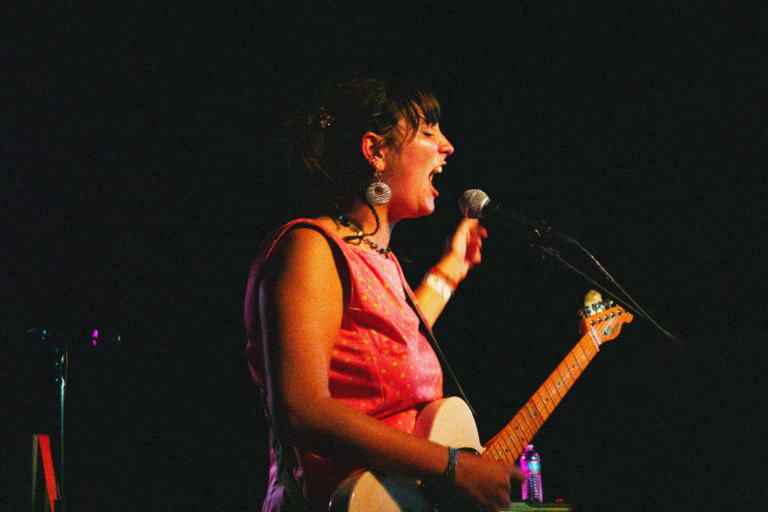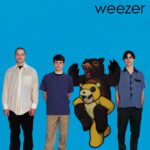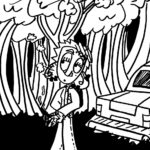Birthday Girl D.C. can’t stop giggling. The first thing you notice about them is how comfortable they are with each other. Onstage during their sold out Redbrick Presents EP release show at Comet Ping Pong in May they share mischievous looks and joke around with beaming smiles. The day after, it’s late afternoon and I’m sitting on a call with frontwoman Mabel Canty and drummer Tess Kontarinis, short of bassist Bella MacKaye. Their laughter maxes out their computer microphone, which is balancing haphazardly on the bed they’re sharing in Canty’s room. They’re casual and playful, still in pajamas and bragging that they stayed up all night after the show. It’s almost like I’m let into their exclusive sleepover.
They claim they will be Best Friends Forever and it’s not hard to believe them. “Suck my balls!” Canty retorts to people, read grown-ups, who advise against mixing friendship and business. Which makes sense—they are personable and unserious on and off the stage, chatting with fans in teenage slang between songs or sharing quick asides with each other during our interview.
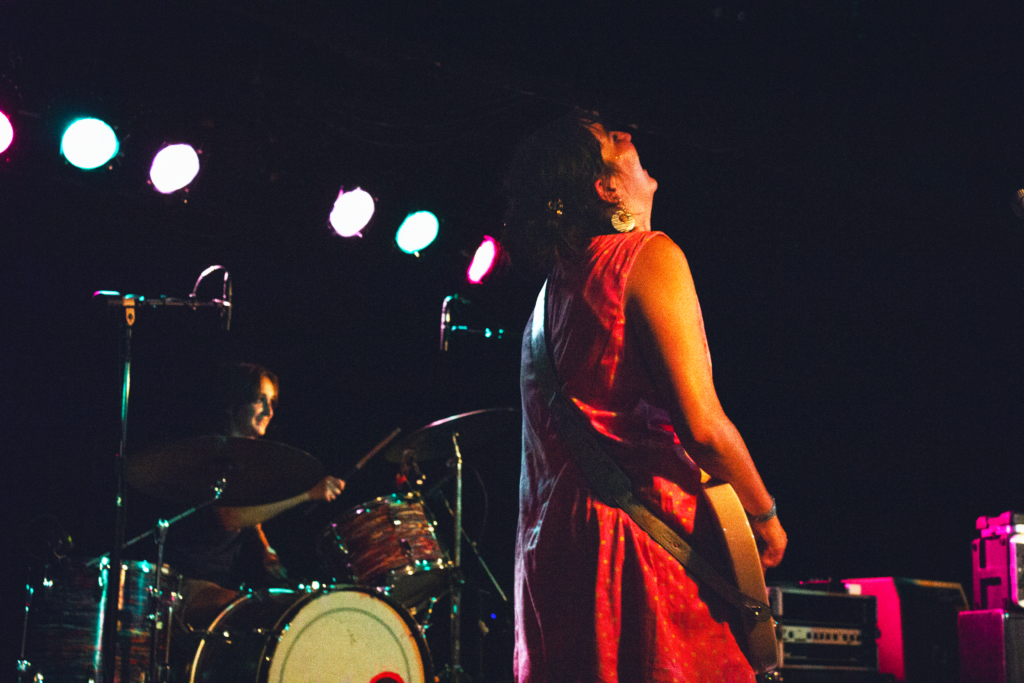
The first time I saw them perform, opening for Snail Mail alongside Flowers For The Dead, I admit I wasn’t too interested in their set. Until Canty mentioned she’d written the last song when she was 12 and was now performing it four years later at 16. I was amazed by how they’d landed the gig and how they were wholly themselves onstage. Only later did I realize they were descendants of famous D.C. punks Brendan Canty and Alec MacKaye — members of Fugazi, Minor Threat, Rites of Spring, The Untouchables, to name a few.
Birthday Girl has supported an impressive roster of bands on tour, opening for Bikini Kill, Jack White and Guided By Voices as well as having toured the East Coast opening for Mary Timony. With the new EP, four-track Dirtier, Birthday Girl has given more reason for anyone in the scene to tune in closer. The project is reminiscent of their debut self-titled album, but relies more on Canty’s guitar, allowing it to take greater control of their sound. The lyrics are sharper and follow a clear narrative, one based on a short story Canty wrote when she was younger. She hints at feelings of desire and longing in the midst of a first-time heartbreak. There’s beauty in how they don’t try to pose as older than they are. They never smudge the black X’s on their hands, never shying away from showing their teenagerish-ness.
They might not be the most unique group active in the D.C. scene today, but Birthday Girl D.C. are bringing a wave of young fans into the conversation. More than just bringing their friends out to venues, they’re helping build a foundational layer that will keep local music from dying out in the near future. And that might just be infinitely more valuable than any single, EP, or album.
This interview was recorded on May 19, 2024 and has been edited for length and clarity.
Mabel, Tess, thanks so much for doing this. I’m curious about how and why you started playing music.
Tess Kontarinis: I started playing guitar when I was eight or nine or something, and played that for a while and was not very good. So then I started drumming in sixth grade just for fun because my older brother is a drummer. So I was like, “Oh, you can teach me some stuff.” And he did and then I started drumming more in sophomore year and that became my main focus.
Mabel Canty: I started playing guitar when I was probably, like, nine. I was always writing and singing songs that didn’t really mean anything. I just found so many old recordings of me yelling songs out when I was little. Yeah, I had a band when I was 10, Solid Sound.
How did you start playing together? The three of you.
T: We’ve known each other for seven or eight years now. My younger sister and her are like best friends, and she would come visit Mabel and I randomly came up with her last year in March. We came over to Mabel’s house and went downstairs, and I was like, “Mabel, I started playing the drums,” and then she was like, “Oh, no way! I’m looking for a drummer.” And I was like, “Oh, my God, you’re kidding.” And then we played “Run the Bath,” I think. And then I did this little fill thing, the hi-hat to tom fill, and we were like, “This is revolutionary!” [the two share a laugh]. I didn’t know you were looking for anything like, I actually had no idea, because we didn’t talk. We weren’t really friends.
M: I mean, we had grown up together. We were family friends kind of, then suddenly you were just like, living here. And then Bella and I have known each other since we were born, we always used to go to shows together growing up. And then one day, she was like, “Maybe I should pick up bass.” It was so random, because none of us knew it, none of us were trying to make a band at all. We played together for the first time in March of last year, and then had our album out by July. Or June.
T: July, July.
Your dad recorded the album, right?
M: Yeah, we recorded at my house. The instrumentals were all made together but the songs [were] just a vault of songs that I had and still have all over my journals and phone. The songs were all written between the ages of 12 to 16. The oldest, oldest one is, I think, “All Good Things Must Come to an End.” And that I wrote when I was, like, newly 12 or 11.
How was it growing up with music around you and parents who were into music, playing music? Has it influenced you and your songwriting?
M: Well, for me it was just that I had access to all of it. Like I had access to the, you know, the guitars and the recordings and stuff. Not to answer for you but –
T: No you got it.
M: Tessie used to live down the block from me, and I would go over to her house every night after dinner just to hang out with her family and –
T: [chuckles] I know exactly what you’re gonna say.
M: What…
T: The guitars, we had three guitars or something –
M: Yeah the guitars and –
T: You played the ukulele.
M: Yeah, those are, like, my fun music memories of your house.
T: Really? I’m finding out so much about you.
M: With your siblings, because it was the first time…because my brothers are all older than me, so it wasn’t like I was sitting around writing songs with them, and with you and your siblings like, that was just a fun activity we did.
T: It was also a very safe space to create, I feel. And even now, we’re all older, so there’s even more freedom to explore how we want to sound. My brother just built the studio in our garage with drums, amps and bass and guitar and all these things that we have set up and like, now there’s even more room to play. If I wasn’t in a music family, I probably don’t know what I would do. I don’t know, it’s just awesome, because they’re all so supportive, we’re all supportive of each other’s art and creation, and my sister’s a great singer as well. It’s one of the best things.
M: Music families aren’t anything special unless they’re backed by a lot of love. And all three of us are very lucky to have very loving families.
So when did you start becoming part of the scene, going to shows…because you’re all from D.C., yes?
M: Yeah.
What was your first concert?
T: [laughs]
M: Don’t say whatever you’re gonna say.
T: No because I know the answer. Oh my God, I know the answer.
M: What is it?
T: Wilco at Wolf Trap. I fell asleep. I fell asleep, I’m so sorry. I was like 11 or something. And I was like, “I don’t like this stuff!” And then I, like, put my hood up. And then just fell asleep outside.
M: But like, now going to that, it’s crazy.
T: I know! I’m like, dang, I should have felt it more like I didn’t feel it. I actually don’t think I was 11. I think I was probably a little bit older, maybe. But because I didn’t really go to shows when I was here, I didn’t know anyone my age going to shows, no connections to it. And I also just didn’t know about anyone’s connections.
M: I forgot what my first concert was, I don’t know –
T: When you were born…
M: Yeah, I think I was probably, like, days old when I went to my first show…
T: Don’t say it.
M: When I was five years old, [Tess chuckles] for my birthday, I asked for tickets to see Taylor Swift [Tess breaks out in laughter]. Yes.
T: That’s not a bad thing. Own it, own it!
M: I’m owning it! Yes, I went to the Red Tour and Ed Sheeran opened…
T: Oh, hellllll nooooooo!
M: But that’s crazy! He wasn’t even famous! I saw Taylor Swift the second time when I was older, like, when I was like nine or eight, and Shawn Mendes opened that time.
T: Oh, period. I would see him.
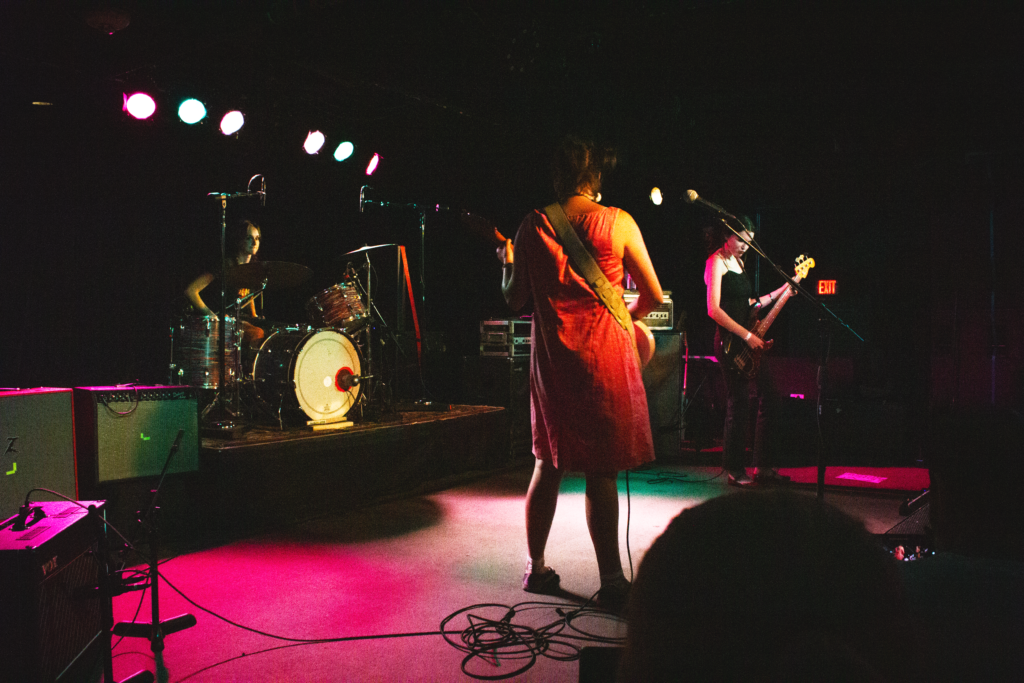
How do you approach songwriting? Do you have a routine that you go through when you write a song?
M: I really hate the nighttime. Like I’ve always hated being awake for it, specifically when I’m alone. Just in my mental health journey I have realized that being alone at night time is a huge trigger for me. And it translated into me just playing after everyone went to bed. My routine is I have a list of things that I hear throughout the day, called “the bucket of words.” Probably every day there’s like one thing to add. You know, all my songs are pretty much plagiarized from people’s mouths.
T: Called her out on that yesterday, I said something and she wrote it down. I said, “You better quote me on that!”
M: It’s so much easier to think about how you want something to be phrased when it’s coming out of someone else’s mouth, like how it feels being said to you. Like in “My Boy,” that story of this relationship that is in the song is just me rephrasing and rewording and processing a story my friend told me and how she saw a boy. They’re all just me trying to process these things, these storylines that I have in my head or that people have told me in some way that’s kind of digestible? And that comes in me overthinking and overthinking and making, you know: “Matching blue dresses, collars of lace/Now I triple dog dare you, look at me” [from “Run the Bath”]. Like I triple dog dare you. Like, that’s just how they end up. But yeah, I have my notes of lyrics, and then I write the music first, and then the lyrics.
Dirtier is based on a short story you wrote?
M: Yeah, when I was 15, I ended up writing, in a very self-reflective way, this poem or short story called Dirty Girl Roams Through the Wood. It has a plot where Dirty Girl is like one perspective, Clean Girl is another, and Clean Girls trying to save…I don’t know, it’s a whole thing.
How does the order make sense to you? Can you walk us through it?
M: That’s my favorite thing about this EP. Cause I love writing and I love explaining my lyrics. This EP really gave me a chance to because there wasn’t a lot to explain, it was just four songs. And we put them in an order that made a lot of sense. So “Allergies” is realizing that you’re not in a good relationship and you’re not treating yourself nicely by being in that relationship. And then “Dirtier” is like the stages of grief or whatever. It has this kind of hope to it where it’s like, it’s all burning down but it’s all coming together. Like, I swear I’m getting better. It’s this certain hope that comes with trying to heal. You’re like, “Well, if I just do this I’m going to be all better forever, I don’t know what y’all are talking about. This is not that hard.” And then you get to “Lemons,” and you’re like, “I deserve a little reward.” It’s like, “I’ve been working so hard on myself. I want to feel human. I want to be a normal teenager.” And then you get to “Purged,” and you realize, “Oh, this is not ever gonna end. This is just being a human.” I was reading a lot of Albert Camus at the point where I was writing. The meaning of life and all that jazz was very prominent in my head. The last line of the short story is “For she may then be a clean body, but she’ll never be a Clean Girl.”
That’s so funny because so many artists hate explaining their lyrics.
M: Yeah, there’s this whole mindset of, like, this song means something to me, and I don’t want it meaning that to you, so I’m gonna gatekeep the meaning. But I think it is something very therapeutic in explaining a point of view.
What are you proudest about about the EP?
T: I love it so much.
M: I literally love it.
T: I feel like it perfectly describes kind of where we all are at now in our lives. Like, even though I’m a bit older and I’m going through different phases that they haven’t done yet, kind of thing. Like going to [college], finding new people, new friends, new space, whatever. I feel like all the songs still pertain to me. It’s a consistent growing up kind of thing. And I feel like we sound way more, like mature and serious. I think we sound serious. No?
M: No, well I can’t tell, but –
T: Not like, serious, but like, No, I mean this. Like what I’m saying, I mean it.
M: Oh, totally, yeah.
T: I think we all put so much care, and we’re very particular of how we wanted each of our parts to sound.
M: We’re so obsessed with making it sound perfect. When the three of us are in the practice room and we’re running through stuff and it doesn’t go well; if it bums one person out, it bums everyone out. And so we have to be kind of careful, because all of our energies are really, like, intertwined and dependent on each other. It’s really cool, because also we’ll be like, so honest, like –
T: “That was bad.”
M: “Oh babe, no more of that, stop.”
T: And also, like, before the shows –
M: Oh my God, there’s no one I’d rather be with.
T: If someone’s anxious –
M: We’re so miserable.
T: Yeah, if one of us is, like, in a shit mood. We’re just like, “No. No.”
M: Like, on tour every night, literally with anyone else I wouldn’t be able to do it because we were so reading each other’s minds.
T: Are we yapping?
No, you’re good. Where do you see your band going?
M: I have no idea. I think we’ll be playing together forever. We will be best friends forever, and I’m sure of it. And so I assume we’ll grow up and have like a million projects.
T: Yeah. Because I also make my own beats.
M: It’s easy to be like, “Oh, we’ve kind of found a bit of success in this, like, young and so we should probably stick with it.” But I’m kind of like, there’s so many other things to do. But I’d like to keep touring.
T: Hmmhmm, I would love to do that again.
M: At the end of this tour we went on, we were talking with Mary [Timony]. She just, I mean, she’s the nicest human on planet Earth, and she was like, asking where we see this going, kind of? Me and Tessie kind of looked at each other like, “oh, this is it.” Like, if there’s a way we can keep that in our lives for a long time, we will.
T: Well, because she’s been playing…all these people that we know and are like family or we’re close to, have been in this business for like, 30 plus years. And they’re still doing it, and they still love what they do, and they take it and make it so positive that you want nothing but to do that.
M: Yeah, the way we got to tour was literally the most positive experience because we were surrounded by all these people that were just so sure of the wonderful connections you can make on tour. Like after shows we’re meeting all these people and playing, like, Bowery Ballroom. It was just so wild. And it was so awesome also to have our parents there. Like, yeah, my dad’s still touring. He lived for it.
T: Right, yeah he will never stop doing that. And it just doesn’t feel like they’re like, “Oh, we have to do this because it’s our job.” It’s like, “Oh yes. Finally, I want to go on tour again,” kind of thing.
M: Or like, “I want to play with people and be able to just come back to my family.” That balance is so wild.
T: Because her dad’s constantly doing shows all over D.C. –
M: And he’s also constantly here.
T: Like, always home, but also always away doing stuff. And also helping us do our thing as well.
M: He’s like the group dad, and he’s best, he’s the best.
Is that how you got to meet Mary Timony?
M: Well, I took classical guitar lessons from her for a bit. So then the guitar lessons turned into recording sessions, and that was the start of the album. She became my mentor. And like, yeah, she’s just so wise and nice and awesome.
Is there a D.C. musician you guys are still yet to meet that you want to meet?
M: H.R. from Bad Brains…Yeah, I just love D.C.
T: We have our show in September with Bikini Kill. I think that that’s like, you know them, and it’s like…because I was kind of thrown into this, Bikini Kill was really big for me and my family.
M: Yeah, it’s huge, huge.
T: And Snail Mail too, that was, that was insane. The fact that that happened-
M: Snail Mail was like the epitome of our first teenage years.
So you guys are often referred to as, like, the future of the D.C. music scene. What do you think of that?
T: I think it’s awesome…
M: Is that true…
T: I just feel like the D.C. scene has been this, like, very punk oriented, fast-paced, alternative thing, and we’re not really doing that. It’s like, there’s bits and pieces of that.
M: If we’re being honest, the people are saying that because of nepotism.
T: Due to the connections that Bella and Mabel have. But I feel like I’m evening the score, cause I have no connection to that. So we can make our own definition of how we want to be perceived by people, if that makes sense. So like, I feel like we’re the future of…
M: We’re not the future.
T: We’re the right now.
M: I’d say that also because there are also so many other D.C. bands, like, we’re just so, so not the only ones.
T: I feel like we all have the same goals, pretty much. I feel like we’re all collectively the right now of D.C.
M: And we all just go to each other’s shows.
T: We’re all so young, like, everyone is like, the same age, pretty much, that we know.
So you mentioned that you feel like some of that comment was coming from nepotism. Does that bother you?
M: The thing is, I think my dad is the best dad. He has put everything into being my dad. He’s one of my best friends and I’m very proud to be his daughter. And then there is just a line to draw when it comes to my music. It’s like, I taught myself guitar, I’ve been singing with the same voice forever. It is a bonding experience making the music because it’s the three of us and my dad sitting over a computer figuring out how we want things to sound. I don’t know. It’s hard because I really do love being his daughter, and I think it comes with a lot of guilt being like, I don’t want my name in the shadow of his.
T: Bruh. You can still be like, not okay with the association you have but still love him.
M: I actually didn’t know who my dad was, like I didn’t know that he was a musician until I was like 13. It was just never a big deal. I didn’t completely grow up in his fame, you know, like I didn’t know it existed. So it makes it a bit more complicated. But to answer your question, I think it’s annoying whenever every write up is like, “Have you ever wondered what happened to Brandon Canty and Ian Mackaye?” And then it’s like, our names.
T: No, no, no, not even. Sometimes it’s like “The trio, Mabel Canty and Isabella Mackaye [pause].” It’s chill though.
M: It is bothersome when it’s our entire identity. But right now it’s not really our entire identity.
T: I think we’re moving away from that very quickly.
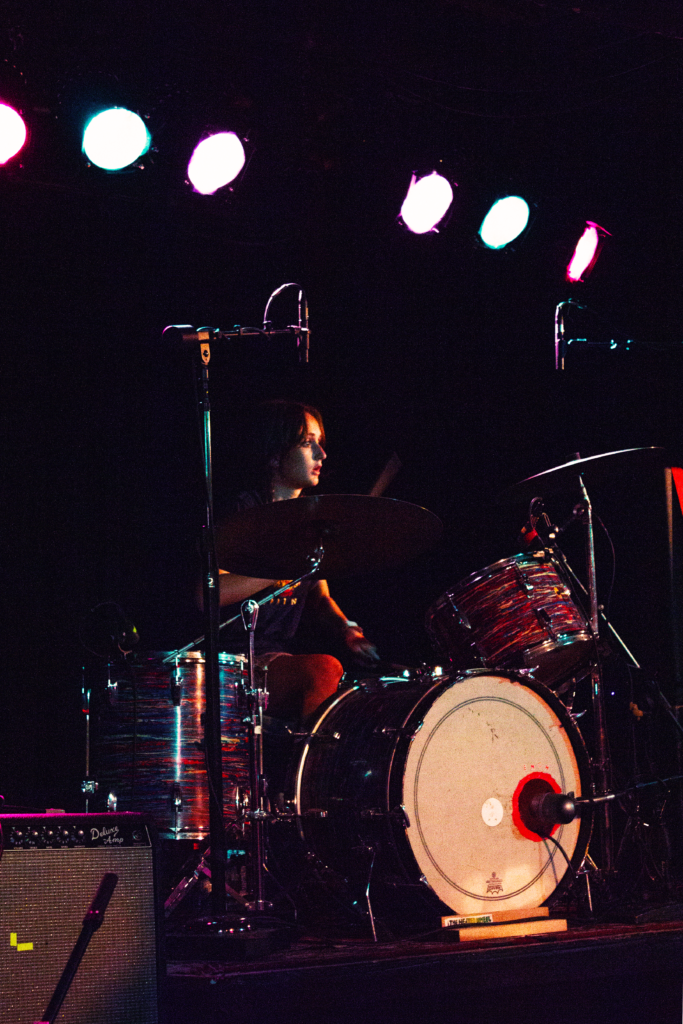
Last night was a sold out show, congratulations.
M: Thank you.
Lot of friends in the audience, it felt like. Does it feel different or better to play in front of a group of friends rather than a group of strangers?
T: I like an even mix.
M: At all of our D.C. shows we have all of our friends standing in a line in the front row, but last night it was kind of different, because they were like, off to the side. So like, the people who were freaking out were not our close friends. Our close friends were off to the side, like crying and swaying. Playing to them is my favorite thing ever, because they all watched everything be made.
T: It’s also really nice to see the same people, like those few people that are our really close friends. It’s really a calming thing to see them while we’re playing and like, know that they have just the best intentions. And like, they love us all so much, they are always there to support us, which is really nice.
Ever since we saw you guys for the first time, I thought your style was super distinctive. It was a big part of your stage presence.
T: Last night was chill vibes and actually pretty grayscale, like I was the only one that had color, which never, never, happens. Never. Mabel’s always in color.
M: I also, I don’t wear pants. I only wear skirts. But I dress like that at school, I wear like, huge skirts –
T: Like four of ‘em.
M: …and big makeup, and because I don’t want to go to school otherwise.
T: It’s who we are.
Mabel, are you gonna be a senior? Tess, you’re graduated from high school right?
M: I’ll be a senior next year, and Bella will too.
T: Yeah, I go to school in California right now but I might be transferring to school in D.C., so I’ll figure it out. But yeah, more Birthday Girl shoooooows! [Update: she recently started attending GW!]
Do you find it hard to be in high school and in a touring band?
M: No.
T: I was in high school when we started it. It was hard for me.
M: We would meet at home at lunch and practice, and then we go and we play a show after school. And then tour, we barely had to miss any school. And our parents all really like that we do music, so they’re all very lenient about that. As long as we get good grades.

